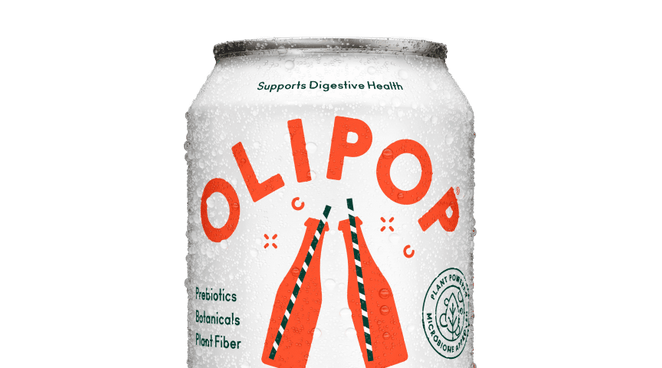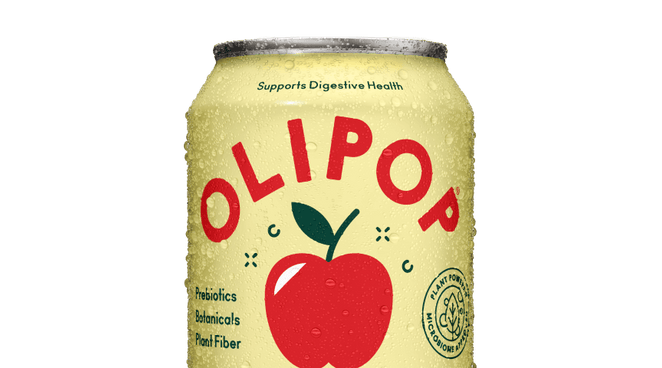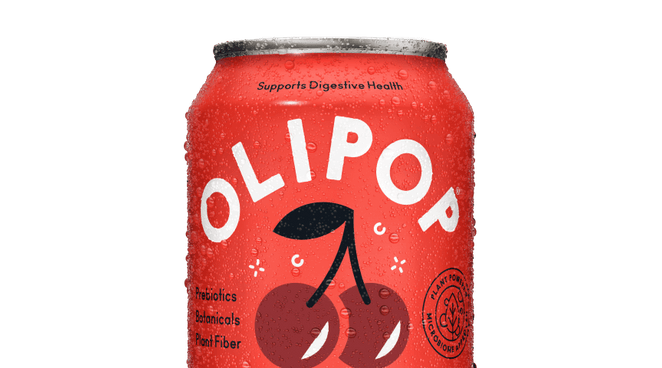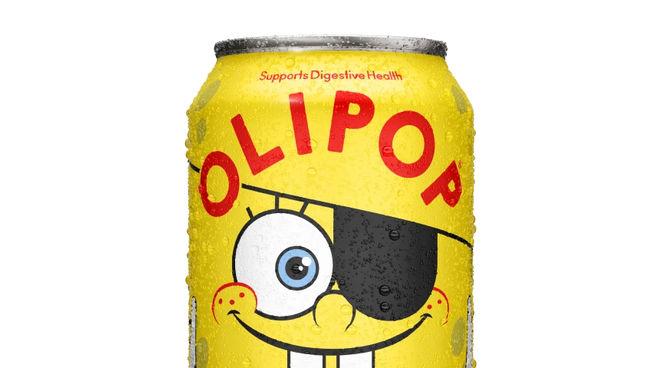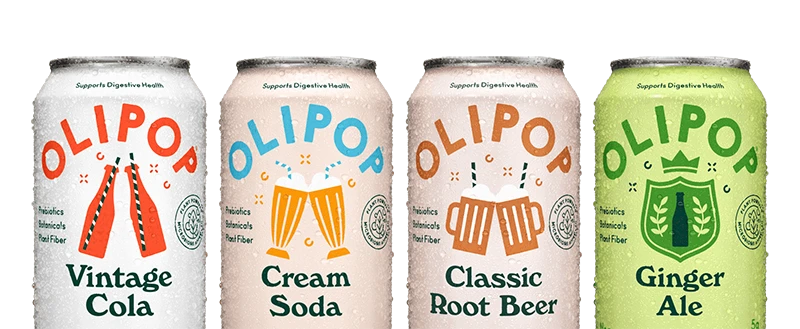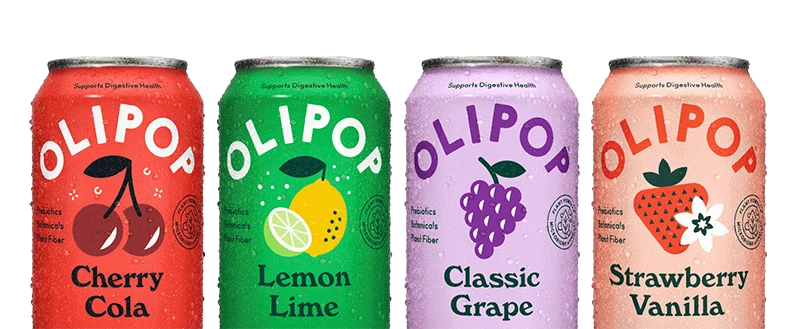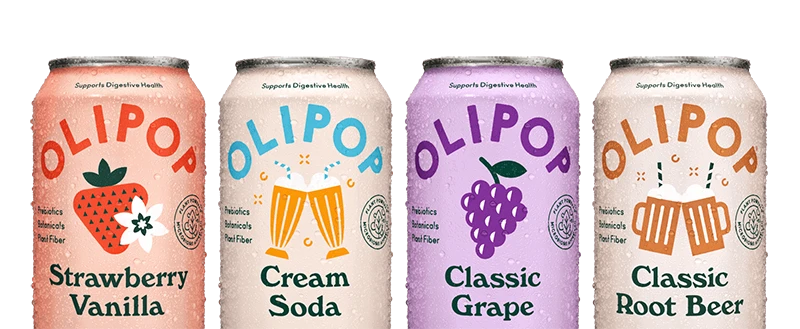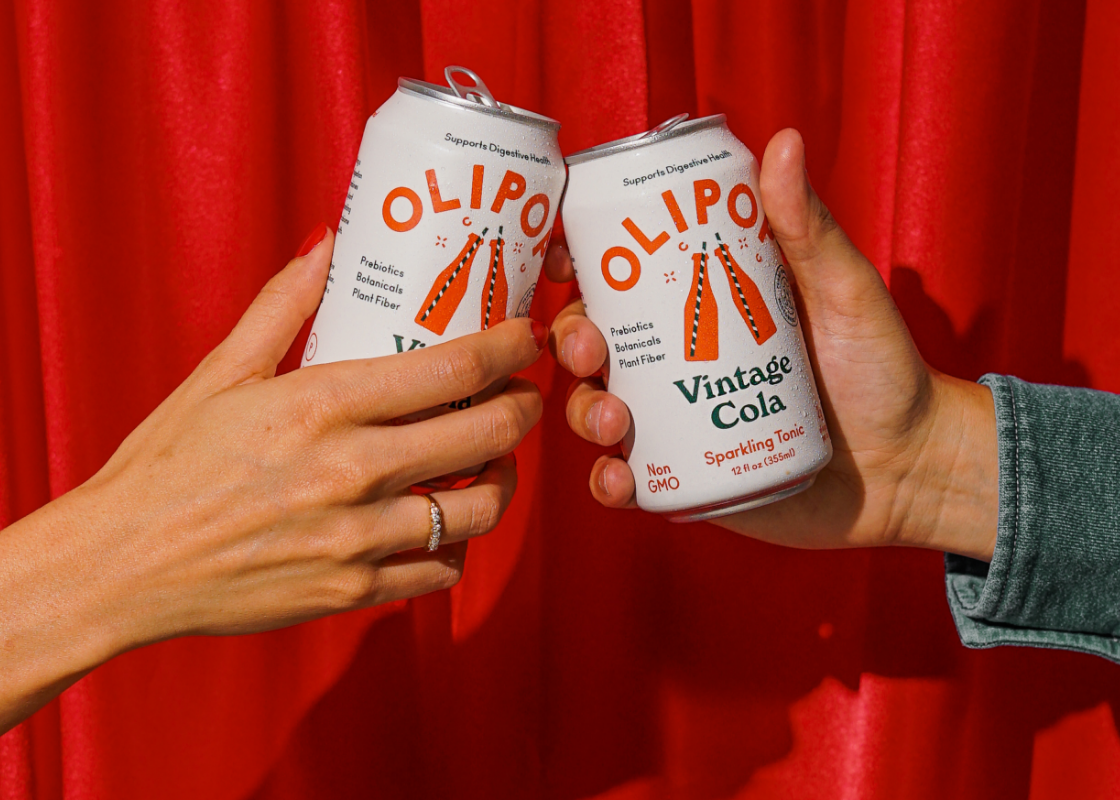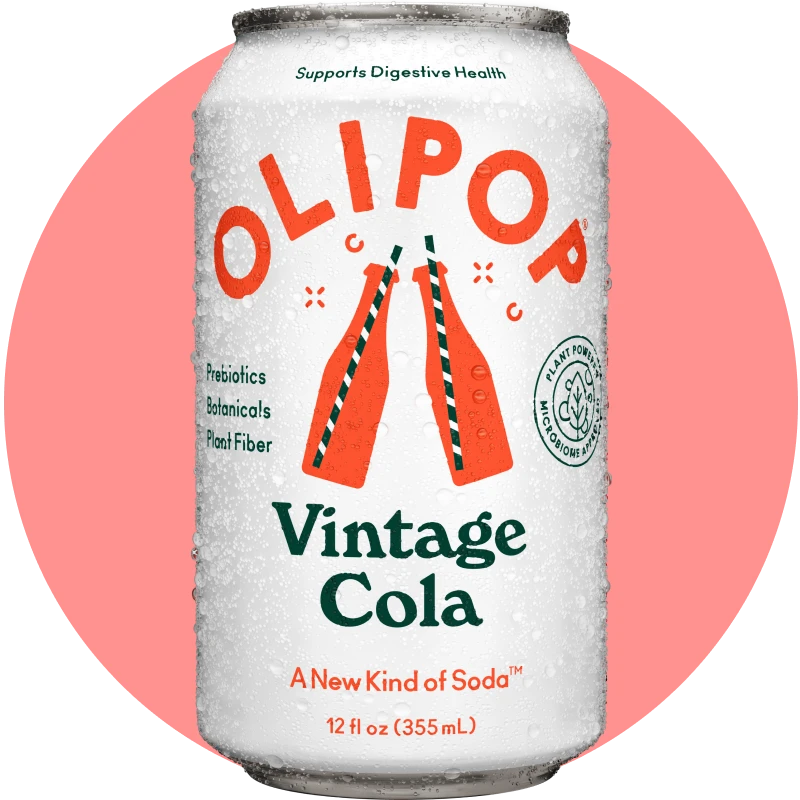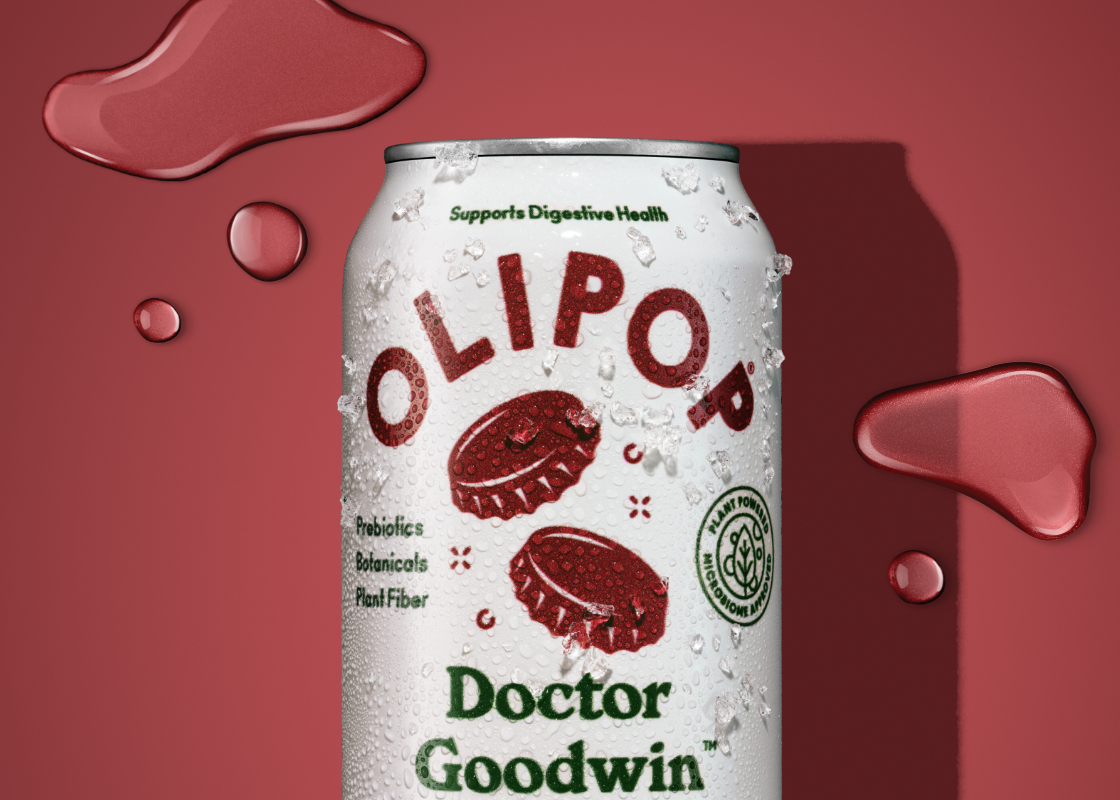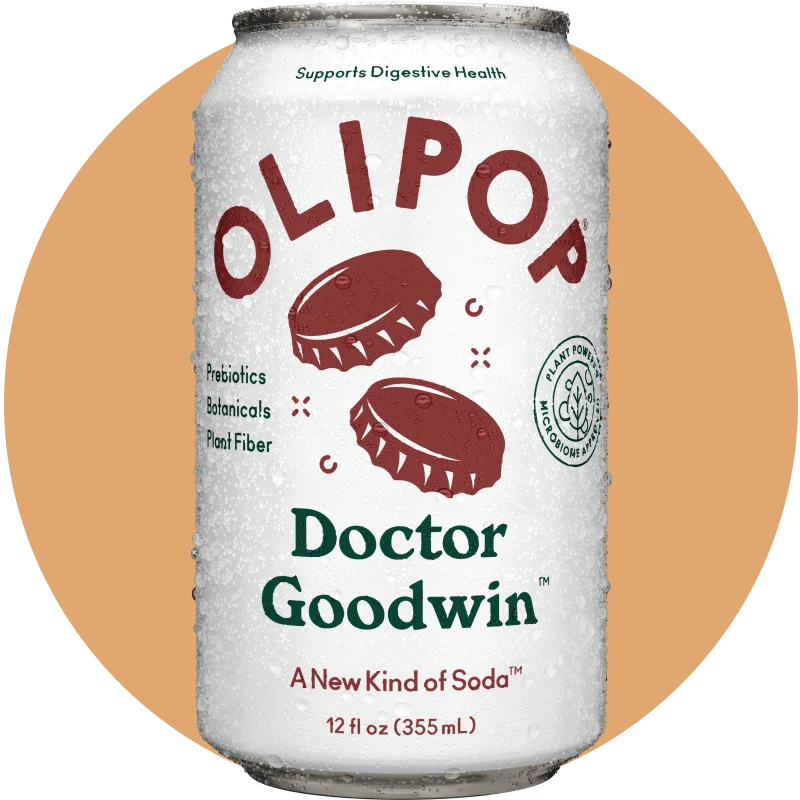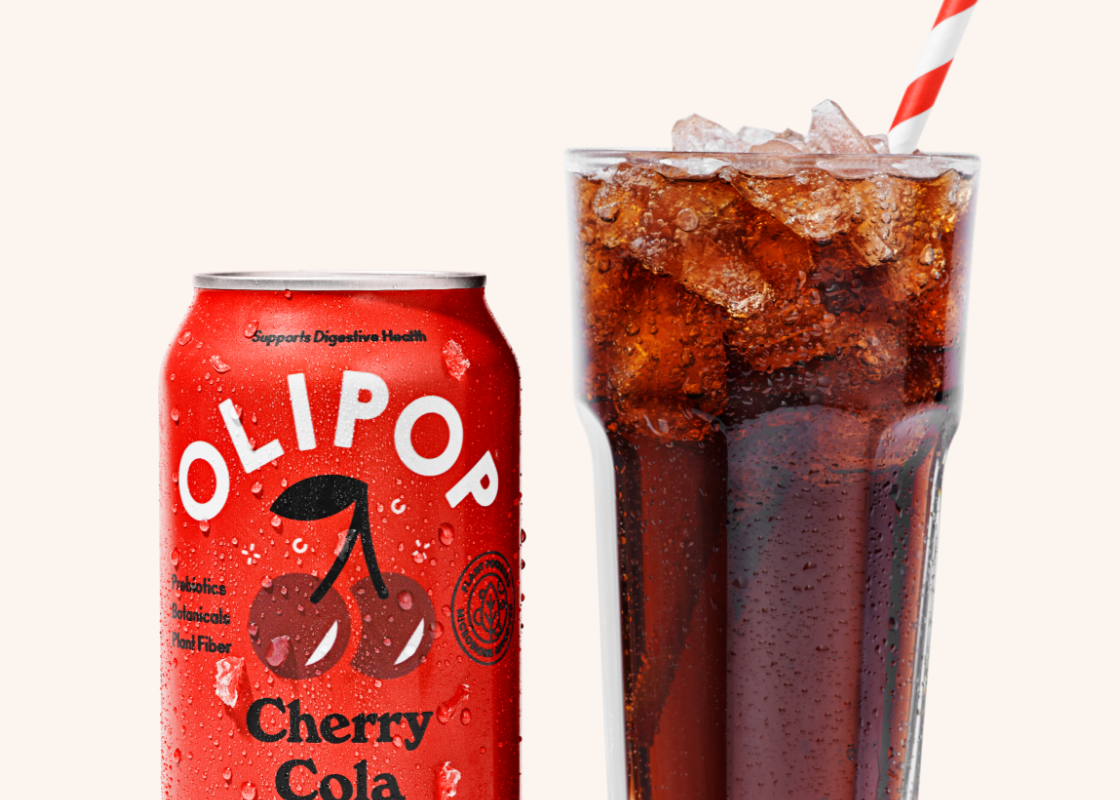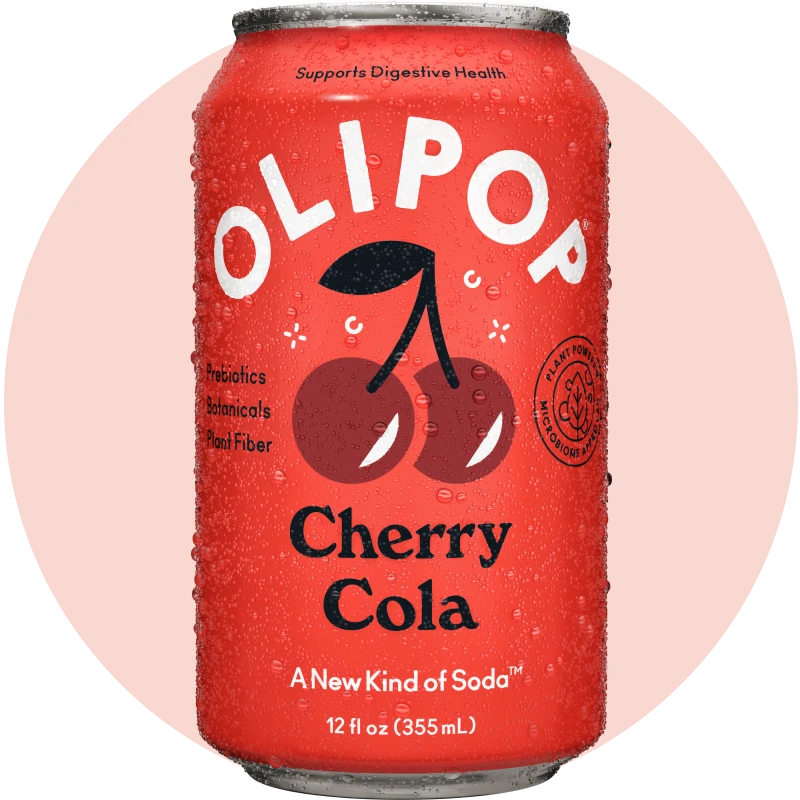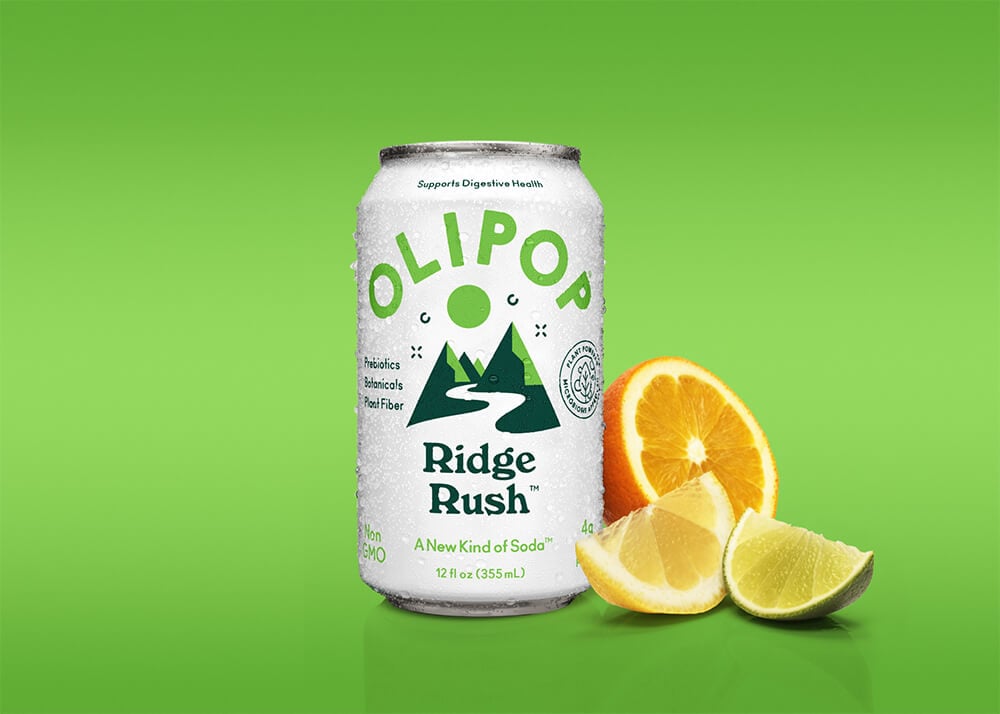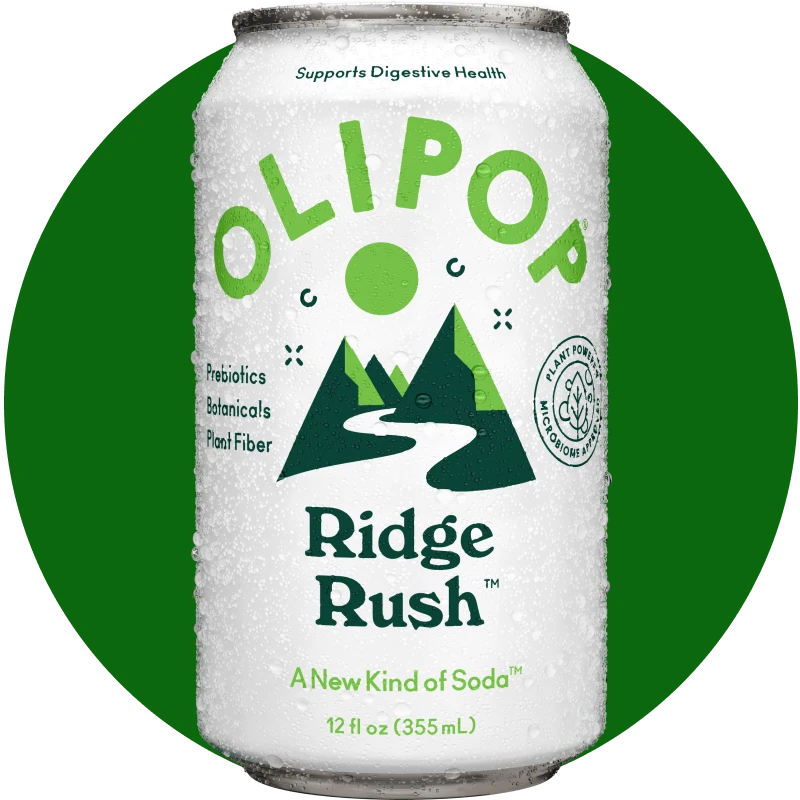Editor's Note: This article is reviewed by Lauren Manaker MS, RDN, LD, a registered dietitian and a paid contributor to OLIPOP. She specializes in digestive health and reviews OLIPOP content for scientific accuracy.
We currently have four flavors that contain caffeine from green tea extract: Vintage Cola, Cherry Cola, Doctor Goodwin, and Ridge Rush. Vintage Cola, Doctor Goodwin, and Cherry Cola contain 50mg of caffeine per can, while Ridge Rush contains 60mg of caffeine per can. The rest of our flavors are caffeine-free! (P.S. We get questions about this but our Root Beer and Strawberry Vanilla flavors do NOT contain caffeine.)
But, if you’re like most people—85% of Americans to be specific!—chances are you’re enjoying a cold energy drink, a cup of steaming tea, or a hot or iced coffee at least once a day.1 Is that daily buzz healthy? How much caffeine should you have per day? And does the type of caffeine you consume matter? Join us as we dive into all these answers and more, including why we chose green tea caffeine for several of our bubbly sodas.
What Is Caffeine?
Caffeine is a naturally occurring chemical found in over 60 different plants, including coffee beans, tea leaves, cacao, guarana, and more.1 2 3 4 It’s a stimulant; hence the energy boost you get from a cup of coffee or an energy drink.3
Is Caffeine Safe?
Recommended Amounts
According to the U.S. Food and Drug Administration (FDA), it’s safe for most adults to consume up to 400mg of caffeine per day.4 That’s the equivalent of around four cups of coffee — as in an actual measuring cup, not a Venti Starbucks cup!5 During pregnancy, that recommendation is reduced to a maximum intake of 300 mg per day, with some experts suggesting to take in even less than that during this stage.
Caffeine Side Effects
Drinking or eating over 400mg of caffeine per day could result in some unwanted side effects, such as:2 3
- Faster breathing or heart rate
- Restlessness
- Shakiness
- Anxiety
- Nausea or dizziness
- Dehydration
- Headaches
- Upset stomach or heartburn
- Insomnia or trouble sleeping
You might also feel like you need to go to the bathroom, which is a common — and sometimes immediate! — feeling for most people, given that caffeine is a diuretic. This means it helps your body flush out extra salt and water.2 This can lead to dehydration and headaches if you’re not drinking enough fluids with your dose of caffeine.
It’s important to keep in mind, however, that caffeine affects everyone differently. So while one cup of coffee might be the perfect zing of energy for one person, it could result in the jitters and an elevated heart rate for another. This all depends on factors such as your genes, diet, metabolism, body weight, medication use, and caffeine tolerance.2 4
Who Should Limit or Avoid Caffeine?
It’s always best to listen to your body if you’re experiencing any negative effects from caffeine consumption. You should also consult with your doctor about how much caffeine you should consume, especially if you are:2 6
-
Pregnant or breastfeeding
-
Taking medication
-
Struggling with depression or anxiety
-
Prone to headaches or migraines
-
Having trouble sleeping
-
Experiencing high blood pressure or heart problems
-
Children
In these instances, it could be best to limit or avoid caffeine entirely.
Why Does Caffeine Give You Energy?
If it’s safe for you to enjoy caffeine, and you decide to drink some, you might notice a boost in energy and alertness within 30 minutes to an hour of sipping a cup of coffee or a few swigs from your energy drink.2 This energy boost is a big reason why so many Americans rely on caffeine to get through a busy day.
As a stimulant, the caffeine in your cup of coffee or energy drink kicks your central nervous system—which controls your heart, muscles, and blood pressure—into high gear.5 But this isn’t the only thing caffeine does to help you feel more alert.
Your body also produces a natural chemical called adenosine throughout the day.6 Adenosine triggers feelings of tiredness that signal to your body it’s time to sleep. Like melatonin, adenosine helps slow your body down, making it easier for you to fall asleep when your head hits the pillow.
But if you’re not ready for a power nap or a restful night’s sleep, then adenosine can be counterproductive to those looming deadlines and tasks you’re trying to tackle. That’s where caffeine comes in. Caffeine blocks adenosine from taking effect, helping you stay more awake and more alert.6
However, over time, your body adjusts to the caffeine you’re drinking by producing more adenosine. This is how you start to build up a tolerance where you need more caffeine to feel the same effects.6
If you’re a long-time caffeine drinker, you’ll most likely remember the days where one cup of coffee or half an energy drink was all you needed to move at the speed of light, and easily churn out that research paper or project. Since then, your body has adjusted and now it takes more caffeine to get to the same place.
Caffeine Dependence and Withdrawal
Too much caffeine can also lead to caffeine dependence. This can result in uncomfortable symptoms when you attempt to reduce or cut your consumption. When you stop consuming caffeine your body suddenly has an overabundance of adenosine.6
This results in symptoms including:2
-
Headaches
-
Sleepiness
-
Irritability
-
Nausea
-
Difficulty concentrating
But don't worry too much if you’re experiencing these symptoms of caffeine withdrawal because your body adjusts over time, and these symptoms will most likely go away after a few days.2
Does the Source of Caffeine Matter?
Most caffeine exists naturally in drinks and products such as tea, coffee, yerba mate, and chocolate.4 However, there are artificial sources of caffeine found in products such as energy drinks, sodas, and snacks. Caffeine contributes to the taste and energy-boosting properties of these artificial products.6
Both naturally and artificially occurring caffeine sources have relatively the same basic effects on the body.1 But the quality of your caffeine source matters. Here are a few reasons why:
The Average Caffeine Content Varies
Most caffeine consumption comes from beverages such as coffee, tea, energy drinks, mate, and more. The amount of caffeine contained in these beverages differs depending on the product and where it’s made.
Here’s the average caffeine content you’re likely to find in some of the most popular sources of caffeine:2 4 5 9
-
An 8-ounce cup of coffee: 95-200mg
-
An 8-ounce cup of espresso: 240–720mg
-
A 12-ounce can of cola: 35-45mg
-
An 8-ounce energy drink: 70-250mg
-
An 8-ounce cup of green or black tea: 30-50mg
-
An 8-ounce cup of yerba mate: 65–130mg
-
A 50g bar of milk chocolate: 10mg
The quantity among brands can vary too, so always double check the label or ask your barista if you have any concerns. The source and brand of your caffeine matters because the amount you’re consuming could be anywhere from 10 to over 720mg of caffeine. And some products, like energy drinks, won’t always give you the actual amount of caffeine on their label.2 If you’re sensitive to caffeine or trying to limit your caffeine consumption, choosing a product you trust with a lower caffeine content is important.
Added Sugar
Unlike OLIPOP’s Ridge Rush, Vintage Cola, Cherry Cola, and Doctor Goodwin flavors, many of the most popular sources of caffeine mentioned above are typically accompanied by a lot of added sugar.6
This is especially true for energy drinks, which have anywhere from 27-32 grams of sugar in a 240g or 8-oz serving. And soda? One 12-ounce can may contain more sugar than any of us should be consuming in an entire day. As for coffee and tea, think of all the sugar you add to the cups you make for yourself.
So, if you’re cracking open a soda can or enjoying a sugar-filled latte every single day, you’re getting more than just an energy boost. You’re also loading your body up with unhealthy added sugars.
Caffeine Supplements
Some caffeine products, such as supplements, can pose a major health concern, as they can put someone at risk of dying from over-caffeination.4 According to the FDA, a toxic level of caffeine is around 1,200 milligrams or 0.15 tablespoons of pure caffeine.4
Dietary caffeine supplements make it easy to go above and beyond the recommended serving of caffeine into this territory of toxicity.4 This is why, as of 2018, the FDA considers it unlawful to sell concentrated caffeine supplements to consumers in bulk.4
How Much Caffeine Is in Soda?
So, we mentioned how much caffeine is in OLIPOP and other popular caffeine sources. But let's dive deeper into the amount of caffeine you'll find in traditional soda. Soda's caffeine content can vary depending on the brand and type. But here are some general guidelines for the most common types of soda:
- Cola Drinks: A 12-ounce (355 ml) can of cola typically contains around 30 to 40 milligrams of caffeine. However, this can vary between brands and may be higher or lower in some cases.
- Diet Soda: Diet soda drinks usually contain caffeine, but the exact amount can vary. It's often similar to regular cola, with about 30 to 40 milligrams of caffeine per 12-ounce can.
- Root Beer and Other Non-Cola Sodas: Many non-cola sodas are caffeine-free, but some root beer brands, for example, may contain a small amount of caffeine, usually less than 10 milligrams per 12-ounce can.
Keep in mind that these are approximate values, and the actual caffeine content can vary between different brands and product formulations. Always check the back label or contact the manufacturer for precise caffeine information if you have specific dietary concerns or are sensitive to caffeine. And don't forget that some sodas come in larger serving sizes, which would contain more caffeine than a standard 12-ounce can.
Green Tea Caffeine in OLIPOP
Now, let's talk about OLIPOP and how our caffeine is a little bit different than those other soda brands. We use 50-60mg of green tea caffeine in four of our flavors. It's a caffeine found in green tea leaves and is one of the world’s oldest and most popular drinks.
Many parts of the globe, including the places where it's most commonly grown, have been using green tea for centuries.10 An 8oz serving of green tea has anywhere from 30mg to 50mg of caffeine, depending on the plant.
Why Green Tea Caffeine?
Unlike the caffeine in coffee or energy drinks, green tea caffeine offers more of a milder energy buzz thanks to the amino acid L-theanine.9 The combination of L-theanine and caffeine helps to boost alertness without any of the elevated heart rate or restlessness that often accompany a stronger caffeine source.9 This makes green tea a preferred source of caffeine for a lot of people who aren’t looking for that jumpy “over-caffeinated” feel.
All this and more is what makes green tea one of the highest quality sources of caffeine that you can find.7 This is why we include it as our caffeine source of choice in our Ridge Rush, Vintage Cola, Cherry Cola, and Doctor Goodwin flavors.
Learn more about our Ridge Rush, Vintage Cola, Cherry Cola, and Doctor Goodwin flavors and why they’re a healthier alternative to other soda brands, and make sure to order yours today!
Sources
-
International Food Information Council. (2019, October 9). What is Caffeine? Food Insight. Retrieved December 8, 2021, from https://foodinsight.org/caffeine/what-is-caffeine/
-
National Library of Medicine. (2021, September 21). Caffeine. MedlinePlus. Retrieved December 8, 2021, from https://medlineplus.gov/caffeine.html
-
Alcohol and Drug Foundation. (2021, November 10). Caffeine. Retrieved December 8, 2021, from https://adf.org.au/drug-facts/caffeine/
-
U.S. Food and Drug Administration. (2018, December 12). Spilling the Beans: How Much Caffeine is Too Much? Retrieved December 8, 2021, from https://www.fda.gov/consumers/consumer-updates/spilling-beans-how-much-caffeine-too-much
-
WebMD. (n.d.). CAFFEINE: Overview, Uses, Side Effects, Precautions, Interactions, Dosing and Reviews. Retrieved December 8, 2021, from https://www.webmd.com/vitamins/ai/ingredientmono-979/caffeine
-
National Institutes of Health. (2020, November 3). Tired or Wired? NIH News in Health. Retrieved December 8, 2021, from https://newsinhealth.nih.gov/2020/10/tired-or-wired
-
Kochman, J., Jakubczyk, K., Antoniewicz, J., Mruk, H., & Janda, K. (2020). Health Benefits and Chemical Composition of Matcha Green Tea: A Review. Molecules, 26(1), 85. https://doi.org/10.3390/molecules26010085
-
Mancini, E., Beglinger, C., Drewe, J., Zanchi, D., Lang, U. E., & Borgwardt, S. (2017). Green tea effects on cognition, mood and human brain function: A systematic review. Phytomedicine, 34, 26–37. https://doi.org/10.1016/j.phymed.2017.07.008
-
Heckman, M. A., Weil, J., & de Mejia, E. G. (2010). Caffeine (1, 3, 7-trimethylxanthine) in Foods: A Comprehensive Review on Consumption, Functionality, Safety, and Regulatory Matters. Journal of Food Science, 75(3), R77–R87. https://doi.org/10.1111/j.1750-3841.2010.01561.x
-
Musial, C., Kuban-Jankowska, A., & Gorska-Ponikowska, M. (2020). Beneficial Properties of Green Tea Catechins. International Journal of Molecular Sciences, 21(5), 1744. https://doi.org/10.3390/ijms21051744
- Caffeine is a stimulant found in over 60 different plants, including coffee beans, tea leaves, cacao, guarana, and more.
- 4 OLIPOP beverages contain 50-60mg of green tea caffeine: Ridge Rush, Vintage Cola, Cherry Cola, and Doctor Goodwin. The rest of our flavors have zero caffeine.
- OLIPOP uses green tea caffeine because, unlike the caffeine in coffee or energy drinks, it offers more of a milder energy buzz thanks to the amino acid L-theanine.

